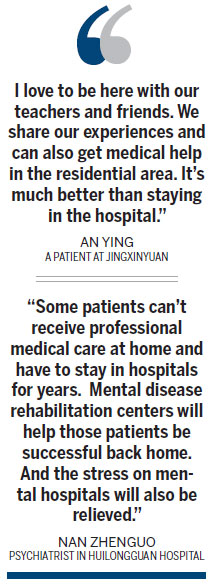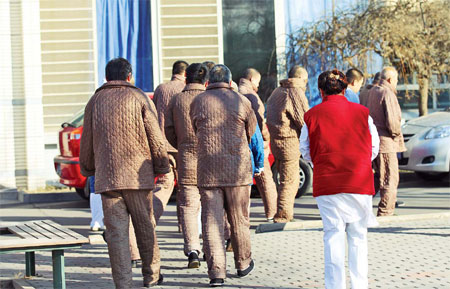Mental healthcare emerges from the shadows
By Yang Wanli and Wu Wencong (China Daily) Updated: 2012-02-03 08:03
|
Outdoor exercise is part of the routine for patients at Huilongguan Hospital in north Beijing. China has a severe shortage of psychiatric hospitals and medical staff. Wang Jing / China Daily |

Finally issue begins to get attention it deserves but much needs to be done, Yang Wanli and Wu Wencong report in Beijing.
Zhang Lijun says he is worried about having a madman living nearby. "What if they unexpectedly have a relapse and attack me? Who knows?"
Zhang, 66, exercises every morning at Yuetan Park in Beijing's Xicheng district. There's a rehabilitation therapy center nearby and he usually avoids it on his way home. Some neighbors have told their children not to play near the center, he said.
They, like Zhang, are afraid of the patients. But at least these patients, unlike thousands of other people in Beijing with mental illness, are being treated.
Jingxinyuan rehabilitation therapy center is one of the few in China specifically for the mentally ill. It was built in 2008 and has 10 outpatients who spend their days there, receiving medical care and guidance.
All were judged to be safe when they were released from hospitals and none have harmed any neighbors.
Beijing had about 34,000 mental patients on record in 2010, "but the exact number is estimated to be around 60,000," said Wang Tong, deputy-director of rehabilitation for Beijing Disabled Persons' Federation.
The federation operates Warm Home centers for people with all kinds of disabilities, 360 centers in every district and county at the end of 2011. But the mentally ill seldom go there because so little professional help is available.
"The mentally disabled are a special group who find it hard to lead normal lives after they leave the hospital," Wang said. "Without a doctor's guidance, other people are seldom willing to be alone with them."
Service shortage
The most recent data available from the National Center for Mental Health, part of the Center for Disease Control and Prevention, show that in 2009 China had more than 100 million mental disease patients, 16 million of them severe cases. That means one in 13 people in China has a mental problem, and one in 100 is a severe case.
The incidence of mental illness jumped from 27 per 1,000 in the 1950s to 175 in 2009. However, the numbers of psychiatrists and treatment facilities greatly lag the need.
CDC statistics show there is only one psychiatrist in China for every 900 patients, and one hospital bed for every 120 mental patients. In many county-level cities in underdeveloped regions, there are no mental hospitals.
The Beijing Health Bureau reports that the capital has 1,000 psychiatrists, about 2,000 psychiatric nurses - and an estimated 60,000 mental patients.
Huilongguan Hospital, the most renowned psychiatric hospital in Beijing, operates at an overload. It has 24 sections, each with average capacity for 60 inpatients. Only one is for patients who can take care of themselves; the rest are for severe cases.
The city's two other psychiatric hospitals, Peking University Sixth Hospital and Beijing Anding Hospital, operate at capacity. Sixth has about 500 beds and Anding more than 800.
More outpatients
"The hospital beds are not enough and we added more," said Yang Fude, Huilongguan's president. "There are so many patients who need to be treated that the public health sector has to make rules asking us to shorten the time that patients stay in the hospital."
He said the hospital has 180 doctors and more than 1,400 inpatients. Outpatient visits have increased 20 percent a year in the past five years. At the depression clinic, appointments must be made three months in advance.
Yang said the hospital can't afford many more psychiatrists. The government determines how many a hospital needs and pays for them, but any additional medical staff must be paid by the hospital.
"The enrollment figure (for doctors) given to our hospital hasn't changed since 1993. However, the number of patients is climbing fast," Yang said.
Twenty years ago, he said, the hospital operated at 80 percent of capacity and doctors were required to record their patients' mental condition once every month or two. "But now, it should be recorded every three days," Yang said.
Busy, and paid less
At 10 am on a Monday in January, some patients were taking a walk outside Huilongguan Hospital, in Changping district. Their blue and white pajamas peeked out from their winter coats, identifying them as patients.
Wang Mei, one of the nurses in charge of the group, was preparing for a clay-modeling class that would start when her patients returned inside. "Our section has 62 patients right now. Compared with nurses in general hospitals, we bear more mental stress. Only three nurses for night duty, but we should take care of about 60 patients," she said.
Nurses are responsible for all of a patient's daily needs, including bathing, combing hair and trimming fingernails. Despite such regular and close contact, they sometimes face physical risks.
Wang said a male patient once grasped her throat, and she couldn't breathe. "I was scared at the very beginning, but soon calmed down and pressed an alarm ring. A security guard saved me," she said. "Not all nurses can bear that."
Yang, the hospital president, said about one-third of nurses quit every year. Psychiatrists are paid less than physicians in general hospitals. "They earn half but do more work," Yang said. "Because of that, fewer students choose to learn psychiatry, and some medical colleges have even canceled the subject."
China's CDC has no specific information on the colleges or number of medical students, but did say the country has about 20,000 psychiatrists and that at least 56 million people need treatment for mental illness but never receive it.
Transition, guidance
While more mental patients are seeking professional help from psychiatrists, psychologists and the like, leaving the hospital poses its own problems.
"Some patients can't receive professional medical care at home and have to stay in hospitals for years," said Nan Zhenguo, a psychiatrist in Huilongguan Hospital. "Mental disease rehabilitation centers will help those patients be successful back home. And the stress on mental hospitals will also be relieved."
He said that rehabilitation therapy centers have been widely promoted in Western countries as the best way to help mental patients lead normal lives. "But in China, they are still underdeveloped," he said. Jingxinyuan is the country's only such center with the assistance of psychiatrists.
An Ying, 37, gets help at Jing-xinyuan five days a week. "I love to be here with our teachers and friends. We share our experiences and can also get medical help in the residential area. It's much better than staying in the hospital."
An, who taught in a kindergarten, was diagnosed with schizophrenia at age 23. She spent three months at Huilongguan Hospital and now takes her medicine on time every day.
After leaving the hospital, she said, she could stick with a task or activity for only one hour before growing anxious. Now, with rehabilitation training, she can participate at the center for more than two hours.
The center provides several classes, including reading and homemaking, to help its patients become self-sufficient. Activities run from 9 to 11 am and 2 to 5 pm. An and her patient-friends are there every day, and they can contact a teacher directly if needed. Doctors and nurses from Huilongguan come to give professional medical guidance, individually and in group sessions, every week.
"Medical help is quite essential to the patients," nurse Zhao Jing said. "Every Wednesday is doctor's day. Patients and their family members will come and we do discussion face-to-face, which is very effective to improve their mental condition."
Zhao believes that rehabilitation therapy is the best way to help mental patients back into society. "Some patients stay in the hospital for more than two decades, which only makes their social ability worse," she said.
Before Jingxinyuan was established, many patients could only stay at home, and their family members often formed support groups. They gathered regularly with others in the same situation to share what they had learned from doctors and books and to help each other.
That's still the best option for thousands in Beijing who need mental rehabilitation. Jingxinyuan can accommodate only 15 patients.
Expectations
China, of course, is not the only country trying to provide mental health services more effectively and efficiently. The United States started in the 1960s to replace long-stay psychiatric hospitals with less isolated, community mental health service for people diagnosed with a mental disorder or developmental disability.
That movement reduced the number of psychiatric hospital beds from 560,000 to 140,000, and boosted the share of services provided outside hospitals from 22.6 to 71.6 percent. It also cut patients' expenditures on their illness, from $15,600 a year to $900, according to an article published last year in the journal Chinese Health Resources.
Yang, Huilongguan's president, said community mental health centers in many developed countries usually are staffed by clinical psychiatrists, clinical psychologists, doctors who treat physical illness, social workers, psychiatric nurses, and other support staff.
Each team has one or two psychiatrists. All team members have received professional training, and have not only solid professional knowledge but also rich social experiences to handle all kinds of interpersonal relationships.
Beijing carried out a survey on the living conditions of mentally disabled people last year. When the report is issued - no date has been announced - it is expected to recommend the addition of more psychiatric rehabilitation centers.
"The system has not yet been built in China," Yang said. "Jingxinyuan is the first attempt and we are calling for more. Having a good mental disease medical system is not only needed to meet the great need, but also to show the country's attitude toward mental disease.
"Despite good living conditions," he said, "a healthy mental condition is also essential to make a happy life."
Write the reporters at yangwanli@chinadaily.com.cn and wuwencong@chinadaily.com.cn.
|
An Ying (left) learns to dance from Zhao Yiwen at Jingxinyuan rehabilitation therapy center in Beijing. The community-based center, unique in having psychiatrists participate, helps patients cross the bridge from hospitalization to society. Zou Hong / China Daily |


(China Daily 02/03/2012 page1)
- China adjusts method of calculating GDP, including R&D expenditure
- Service sector expansion reflects restructuring
- Pierre & Vacances-Center Parcs Group joins HNA to bring in French style
- Postal Savings Bank of China files prelisting documents
- Alibaba said to pay $200m for Wandoujia app store
- Chinese govt discourages iron, steel exports amid lackluster demand
- Service mishaps highlight disconnect with users
- LSE and Deutsche Boerse may go Dutch to win over regulators




















